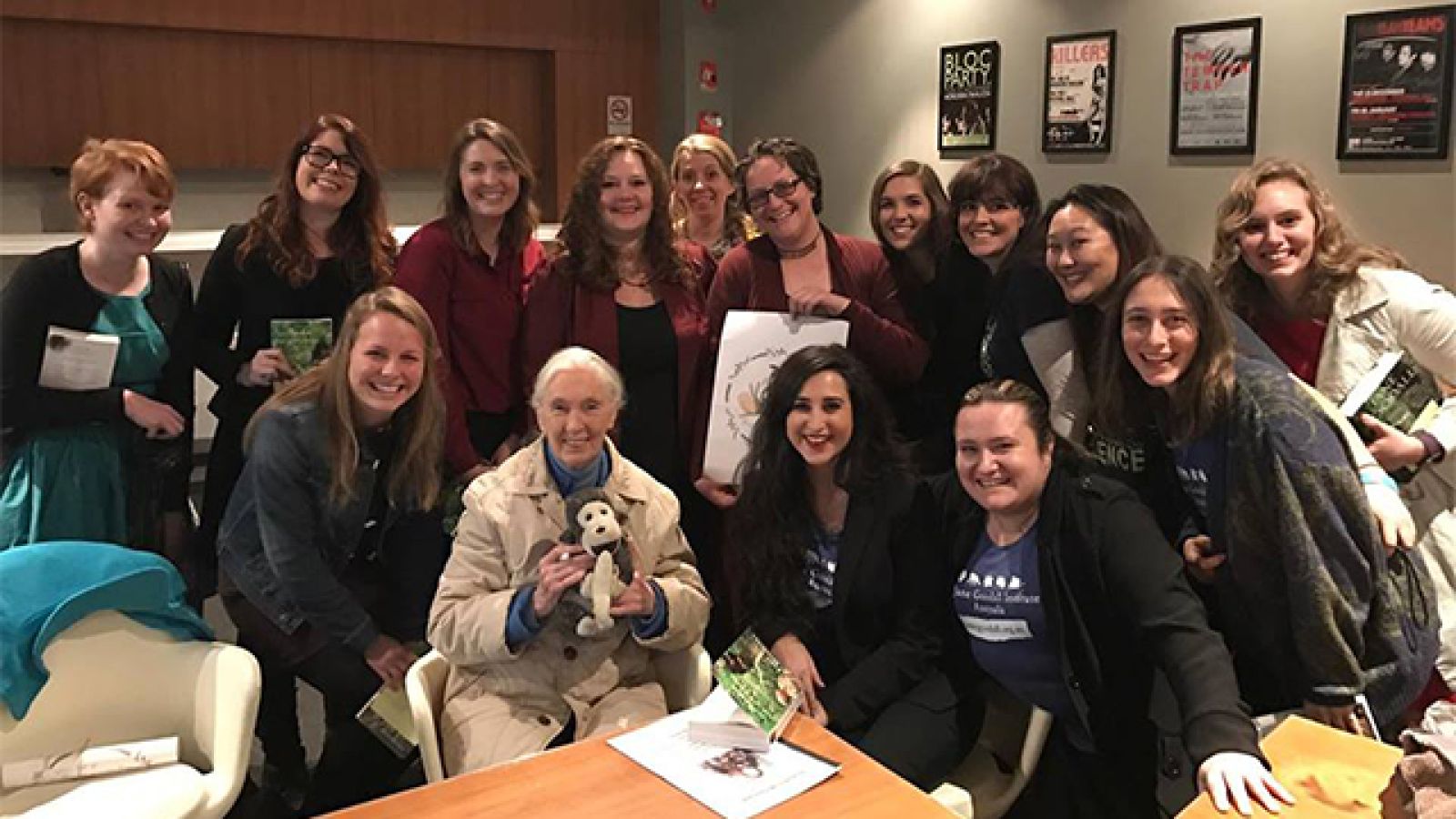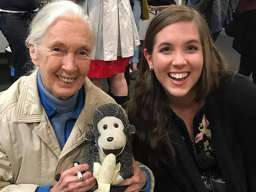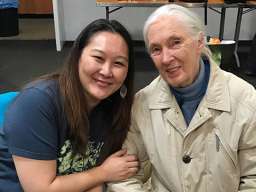ANU primatology students' once-in-a-lifetime experience with Dr Jane Goodall

ANU primatology students, Dr Alison Behie, and Dr Jane Goodall.
It’s not every day you get to meet your hero – or heroine. Eight ANU primatology students did just that, during world-renowned primatologist and conservationist Dr Jane Goodall’s recent Australian tour.
Honours student Grace Miller was one of the eight – all students of Dr Alison Behie, Head of Biological Anthropology in the ANU School of Archaeology and Anthropology.
Grace’s research focuses on reproductive strategies used by the world’s captive chimp population. She described Dr Goodall’s calm, welcoming manner, the collective admiration of everyone in the room, and her own awe.
“When Jane spoke of having hope, to all of us who are fighting a painful fight for conservation, the room was electric with affirmation and optimism,” Grace says.
First year PhD student Jessica Williams found meeting Dr Goodall exciting and a little overwhelming. Dr Goodall had inspired her to pursue primatology research at a time when she had completed her Honours and was deciding what to do next.
Jessica, who is now working to produce best practice guidelines for ecotourism involving wild gibbons – the most understudied family of apes – asked Dr Goodall for her thoughts on ecotourism as a conservation tool.
“Ecotourism is becoming an increasingly popular way of generating the funds necessary to achieve conservation and development goals in remote, poverty affected areas,” Jessica says.
“Jane believes that when it is managed correctly and involves local people, ecotourism can be successful in meeting these conservation goals.”
The exclusive meet and greet was organised by Nicky Kim-McCormack, another ANU PhD candidate in primatology. Nicky is the Chimp Guardian Manager at the Jane Goodall Institute Australia (JGIA); the Australian chapter of the conservation organization Dr Goodall founded in 1977.
“I first learned about Jane through old National Geographic magazines my sister and I used to collect when I was young,” Nicky says.
“Back then, I imagined how great her life among the chimpanzees would be and how her discovery of tool use in chimps made everyone rethink about themselves.
“I hoped that one day I could lead a life just as fulfilling and inspiring.”
Nicky’s research, involving digital enrichment, is similarly focused on getting people to connect and reflect on the intelligence of great apes, and that upon having a shared interactive experience, they might be inspired to engage in conservation themselves.
“It’s almost a literal take on Dr Goodall’s values and the mission of JGIA – connecting people, animals and the environment,” she explains.
Dr Alison Behie’s flight to Sydney had been delayed, which made her late for the meet and greet.
“I was in tears at Canberra airport when I thought I was going to miss seeing Jane,” Dr Behie says.
Like Jessica, Dr Goodall had set Dr Behie on the path of doing primatology research.
“Jane has always been someone I looked up to and was fascinated by, but it wasn't until I heard her speak in 2001 that I realised I could actually do what she does,” Dr Behie says.
“She got me thinking about how amazing chimpanzees are and how much they can adapt in their environments, which helped me in my own research focusing on primate adaptations to natural disasters.”
Sixteen years later, Dr Behie finally got the chance to talk to Dr Goodall. She told her how she has inspired her not only as a researcher and primatologist, but as a mother.
“Dr Goodall often speaks of her mother and how she encouraged her to be a scientist from an early age and to follow her passions,” Dr Behie says.
“I strive to be that sort of mother myself so as not to limit the potential of my kids.”
Grace used her time with Dr Goodall to ask her about seeking a direction for her future research.
“There are so many species in need of help, and I find all of them deeply fascinating.
“Her advice was to follow opportunity and not to lose hope,” she says.
For Jessica, meeting Dr Goodall has provided her with inspiration to get through those “dark” times in the jungle.
“Reflecting on it will remind me why I am out in the middle of nowhere missing my loved ones, sick of eating rice and dreaming of a real shower,” she says.
Nicky says that meeting Dr Goodall is one of the highlights in her professional and academic career to date.
“She is in many ways a pioneer and my hero, and I will always cherish the conversations and advice she gave us.”
Head of ANU Biological Anthropology Dr Alison Behie is the ACT coordinator of Dr Jane Goodall’s Roots & Shoots program, and she encourages anyone interested in getting involved to visit the Roots & Shoots website or to get in touch with her directly.



